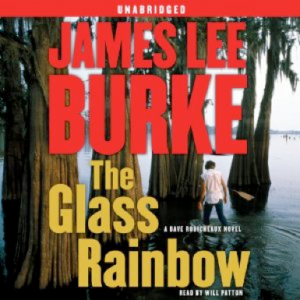Very rarely, but just often enough to keep mystery buffs hoping, a book comes along that is almost perfect. For me, The Glass Rainbow by James Lee Burke was one of those books.
Here’s Booklist’s plot summary:
Dave Robicheaux is back in New Iberia, Louisiana, hoping to enjoy the company of his adopted daughter, Alafair, who is taking a semester off from law school to finish a novel. Not nearly as suspicious of Louisiana’s blood-stained aristocracy as Dave, Alafair has become involved, romantically and otherwise, with Kermit Abelard, a writer who is also the son of one of the region’s most notorious robber barons. Kermit, along with his friend, an ex-con turned best-selling memoirist, volunteers to help Alafair find a publisher for her book, much to Dave’s chagrin. Father-daughter conflict ensues, and as Dave’s investigation of a series of murders veers ever closer to the Abelards, it appears that, yet again, the closets of Louisiana’s rich are knee-deep in skeletons.
But Burke is too good a writer to rely upon the plot , excellent and twisting though it is, to make the book. Here’s what else he does:
- Burke respects his readers. He uses big words. He talks about books, classics, and assumes that writers are smart enough to know what he’s talking about.
- Burke’s descriptive writing is lovely. His descriptions of the Louisiana bayous include references that hint at Hurricane Katrina’s devastation. But, he makes readers want to help restore the countryside without preaching, politicizing or editorializing. And when he writes about the beauty of the land he knows, his love for the countryside shines through.
- Burke creates complex characters. In fact, they are probably the richest, with the most human flaws of any modern mystery writer. The good guys aren’t all that lovable, and he evokes sympathy for bad guys. The main protagonist, Dave Robicheaux, and his best friend, Clete Purcell, are most notable. In this book, they struggle with advancing age and mortality.
- Burke leaves things out. Though his novels are bloody and dark, when things get really bad, he doesn’t go into details. Instead, he tells us what the characters think of what they saw. Their disgust and revulsion is enough.
- Burke believes in good and evil and he clearly delineates between the two. But like real people, his characters struggle with choosing good over evil.
- Will Patton’s audio performance. Somehow, this man conveys the slow, easy pace of southern life with each syllable. How can one man’s voice summon an audio picture of a culture? (Note: If you listen to the audio, be sure it’s the unabridged version. What a crime to miss any of his spectacular writing.)
I’ve read a few of the Dave Robicheaux novels, but it’s time to read them all. If the others are half as good as The Glass Rainbow, they will be a feast.


